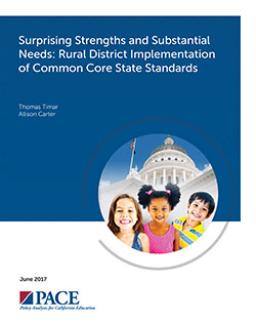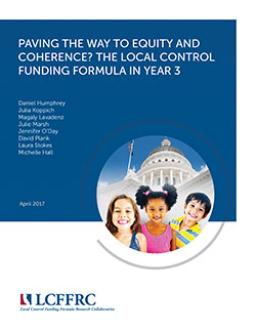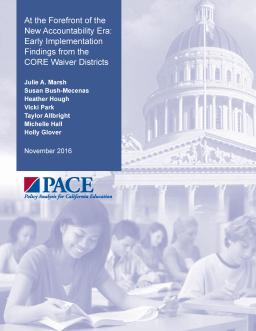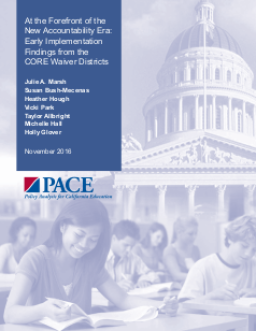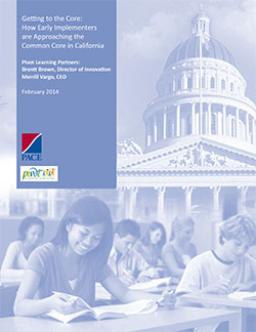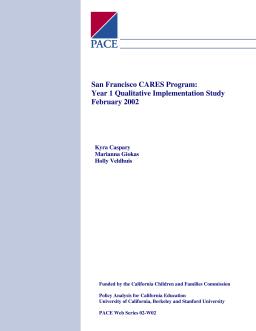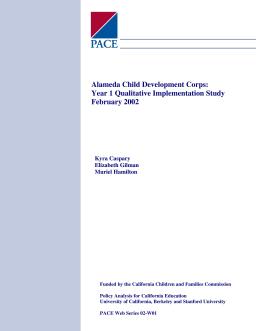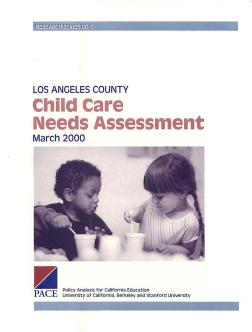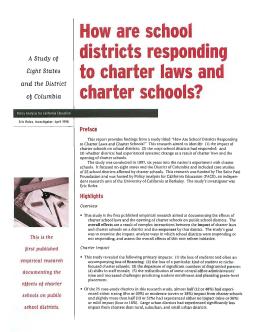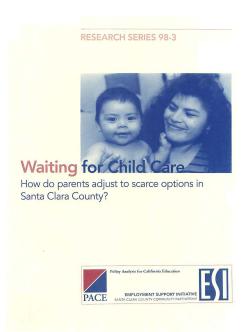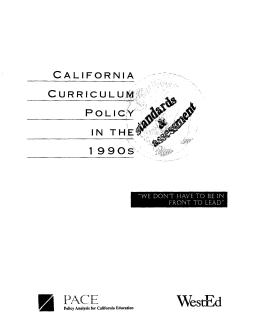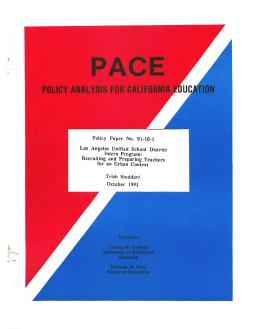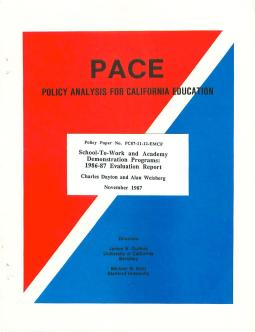Rural District Implementation of Common Core State Standards
Published
Summary
The adoption of the Common Core State Standards (CCSS) in CA has demanded significant changes in teaching and learning, but has also faced challenges due to contextual factors and the simultaneous implementation of other major policy initiatives. Many educators report a lack of high-quality instructional materials and professional development, and rely on peer support for curriculum development. The successful implementation of CCSS requires a shared understanding and uniform practices across districts, which is a complex and demanding skill set for educational agencies and practitioners.
The Local Control Funding Formula in Year 3
Published
Summary
The Local Control Funding Formula (LCFF) gives districts funding authority and requires input from stakeholders to create Local Control Accountability Plans (LCAPs) for equitable resource allocation and improved student outcomes. This report explores stakeholder engagement, implementation challenges, resource allocation, and equity using eight case studies. Despite limitations, this study offers valuable insights into California's K-12 education system's finance and governance.
Early Implementation Findings from the CORE Waiver Districts
Published
Summary
The Local Control and Accountability Plan (LCAP) in California and the federal Every Student Succeeds Act (ESSA) encourage local control in school accountability. The CORE waiver districts have implemented an innovative measurement system and supports for school and district improvement, providing an opportunity to learn from the enactment of a system supported by accountability policy in this new era. This report examines the early implementation and effects of the CORE reform and seeks to inform the ongoing efforts within CORE and future accountability policy in other states and districts.
Learning from the CORE Districts' Focus on Measurement, Capacity Building, and Shared Accountability
Published
Summary
California and the US are undergoing a cultural shift in school accountability policies towards locally-determined measures of school performance. Lessons can be learned from the CORE districts, which developed an innovative accountability system, emphasizing support over sanctions, and utilizing multiple measures of school quality. The CORE districts' measurement system and collaboration hold promise for improving local systems, but efforts to build capacity remain a work in progress.
How Early Implementers are Approaching the Common Core in California
Published
Summary
California has adopted new Common Core State Standards (CCSS), English Language Development (ELD) standards, and Next Generation Science Standards (NGSS). The state has provided funding to support CCSS implementation, and new curriculum frameworks are nearing completion. The report focuses on early implementers of CCSS to identify lessons learned and potential pitfalls, aiming to inform practitioners and policymakers about the variety of CCSS implementation strategies California school districts are choosing.
Year 1—Qualitative Implementation Study
Published
Summary
This report on San Francisco County’s CARES program (SF CARES) provides guidance for policymakers, program administrators, and childcare advocates planning similar initiatives. PACE collected feedback from program planners, stipend recipients, and other childcare community members on aspects of the planning and implementation process. SF CARES successfully distributed over 400 stipends in the program’s first year, but challenges remain in reaching a broader array of childcare providers and communicating program goals.
Year 1—Qualitative Implementation Study
Published
Summary
This report provides guidance on implementing childcare retention initiatives based on Alameda County’s Child Development Corps program. PACE conducted focus groups with stakeholders to gather feedback on the planning and implementation process. The program saw increased commitment from providers to their profession and seeking training opportunities, but challenges remain with fitting permit requirements to family providers and relevance of courses.
Published
Summary
A study conducted for the Los Angeles County Department of Public Social Services aimed to determine the supply and demand of licensed childcare in the county, with a focus on low-income communities and special types of care. The survey analyzed data at three levels: county-wide, service planning areas, and supervisorial districts. Results showed disparities in childcare supply across the county, with shortages in special types of care and little information on where childcare is needed.
A Study of Eight States and the District of Columbia
Published
Summary
This report presents the results of a study investigating the impact of charter schools on school districts, how they responded, and whether they experienced systemic change due to charter laws. The study focused on eight US states and the District of Columbia and included case studies of 25 affected school districts. The research was funded by The Saint Paul Foundation and conducted in 1997, six years into the charter school experiment. PACE hosted the study.
How Do Parents Adjust to Scarce Options in Santa Clara County?
Published
Summary
In 1998, the PACE research center surveyed low-income and blue-collar parents to help streamline the process of finding childcare, in response to the state's welfare reform legislation. The survey included 300 in-depth interviews and covered topics such as employment, searching for childcare, interim childcare, and perceptions of care quality. The report addresses the policy problem and how parents perceive their limited childcare options.
Standards and Assessments
Published
Summary
This study traces California's curriculum-related reforms in mathematics and science during the 1990s, examining the role of the California Department of Education and the state's shifting political and policy context. It analyzes the perceptions of state officials, experts, and the public and how they influenced state policy changes. The authors raise questions about problems associated with curriculum policy in California and presents policy recommendations mentioned during interviews and document analysis. The study does not assess the impact of curriculum on school practice.
Recruiting and Preparing Teachers for an Urban Context
Published
Summary
Traditional teacher recruitment fails to meet urban area and high-demand subject needs. Alternative certification programs offer a solution but are criticized for being a "quick fix". The LAUSD Intern Program case study addresses questions on effectiveness and preparation of alternative-certified teachers. On-the-job training is context-specific and not a replacement for college-based education.
1986–87 Evaluation Report
Published
Summary
The Edna McConnell Clark Foundation's School-to-Work and Academy Demonstration programs aim to help disadvantaged high school students transition to work. This evaluation covers the 1986-87 school year and includes a process component that describes each program, and an outcome component that tracks program and non-program students on retention, attendance, credits earned, courses failed, grade point averages, standardized test scores, and surveys. Seven cities were included, with programs varying in structure and age. Evaluation of student outcomes showed varying effects from site to site.
